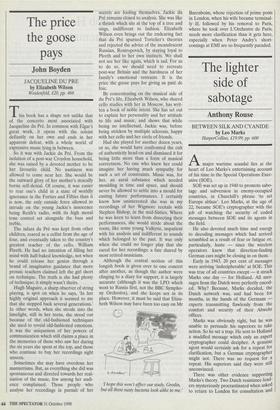The lighter side of sabotage
Anthony Rouse
BETWEEN SILK AND CYANIDE by Leo Marks HarperCollins, £19.99, pp. 600 Amajor wartime scandal lies at the heart of Leo Marks's entertaining account of his time in the Special Operations Exec- utive (SOE).
SOE was set up in 1940 to promote sabo- tage and subversion in enemy-occupied countries, in Churchill's phrase 'to set Europe ablaze'. Leo Marks, at the age of 22, became SOE's cryptographer with the job of watching the security of coded messages between SOE and its agents in the field.
He also devoted much time and energy to decoding messages which had arrived scrambled as a result of fear or fatigue or, particularly, haste — since the wireless operators knew that direction-finding German cars might be closing in on them.
Early in 1943, 20 per cent of messages were arriving 'indecipherable' at SOE. This was true of all countries except — it struck Marks one day — for Holland. All mes- sages from the Dutch were perfectly encod- ed. Why? Because, Marks decided, the Dutch network was, and had been for months, in the hands of the Germans experts transmitting flawlessly from the comfort and security of their Abwehr offices.
Marks was obviously right, but he was unable to persuade his superiors to take action. So he set a trap. He sent to Holland a muddled message which only an expert cryptographer could decipher. A genuine agent would certainly ask for a repeat for clarification, but a German cryptographer might not. There was no request for a repeat. His superiors said they were still unconvinced.
There was other evidence supporting Marks's theory. Two Dutch resistance lead- ers mysteriously procrastinated when asked to return to London for consultation and then, when London pressed, mysteriously died. When two jailed resistance men in Holland (`Cabbage' and 'Chive' — agents had vegetable code-names) escaped to England and confirmed what Marks said, they were put under open arrest as suspect- ed Gestapo agents.
Finally, the Germans themselves decided that the game must be up. On April Fool's Day, 1944, Abwehr Major Giskes sent SOE a message regretting the end of 'our long and successful co-operation as your sole agents'. Why Giskes ended it, nobody seems to know.
This disaster was not caused by stupidity, but, it seems, by SOE's fear of admitting the truth and fear for its own survival. The irregular outfit was viewed with suspicion by much of the regular military. The Secret Intelligence Service (SIS), whose job was espionage, disliked SOE since conditions suitable for spying could obviously be jeop- ardised by the conditions created by SOE sabotage.
At the time of Marks's unwelcome dis- covery, SOE was worried that it might be given no role in the invasion of Europe, or that the SIS would take it over. So the drops into Holland continued, money and supplies and agents were parachuted into the grateful arms of the Germans, and SOE promised the chiefs of staff there would be a vast secret army in Holland when the Allied invasion came.
After the war, Marks was not called to the inquiry by the Dutch into the disaster. His first report on his suspicions is missing from the archives. This story is one thread in a lightly written and often funny book.
Marks, a clever Jew with a dangerously quick tongue, failed to get taken on by Bletchley, largely, it seems, because the examiners thought him too clever by half. So he joined SOE as its first and only Cryptographer, and his book is partly about his encounters with the attitudes and preju- dices of the military bureaucrat. 'I didn't mind being addressed by him as if I were an East End barrow-boy because that's how Father's career had started,' he writes of an air force officer. Father, by this time, had a bookshop which became famous in Helene Hanff's book, 84 Charing Cross Road, a work which Marks describes as 'a gentle little myth'.
Apart from the Dutch disaster, Marks's other main battle — successful — was to change the SOE code. By the war's end, Marks had 400 women at work for him deciphering messages. He records that the agents were most frightened of the dentist who hollowed out their teeth to take Cyanide tablets. Of the agents he met, his hero is Yeo-Thomas, the legendary 'White Rabbit', who managed to escape from Buchenwald. His heroine is Violette Szabo, executed by the Germans. Marks's meeting with her has a most moving postscript. Those whose minds gridlock when con- fronted with codes need not worry. Marks includes them sparingly.



















































































 Previous page
Previous page